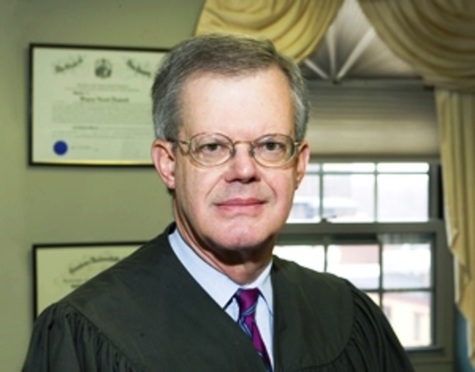NJ Judge Recognizes Cause of Action for Wrongful Prolongation of Life
In a case of first impression, a New Jersey judge has ruled that the family of a woman allegedly resuscitated against her wishes may sue the hospital and its staff for wrongful prolongation of life.
October 13, 2017 at 06:34 PM
7 minute read
 Superior Court Judge W. Hunt Dumont
Superior Court Judge W. Hunt Dumont In a case of first impression, a New Jersey judge has ruled that the family of a woman allegedly resuscitated against her wishes may sue the hospital and its staff for wrongful prolongation of life.
Morris County Superior Court Judge W. Hunt Dumont declined to grant summary judgment in favor of the key defendants, Morristown Medical Center, Dr. Andrew Youseff and several nurses for their role in prolonging the life of a patient named Suzanna Stica.
“Defendants violated Ms. Stica's rights when they resuscitated her against the clear directives,” Dumont said in a statement of reasons dated Sept. 15 and recently obtained by the Law Journal.
The lawsuit was filed by the executor to Stica's estate, Suzanne Koerner.
Stica was admitted to Morristown Medical Center on Nov. 29, 2011, after complaining of breathing problems. She already had signed “do not resuscitate” and “do not intubate” orders ahead of her admission, according to the documents.
Despite those orders, the defendants resuscitated her after she went into cardiac arrest. She lived another six months before she finally died, according to Dumont's ruling. During that time, she experienced pain and suffering, the ruling said.
Stica was intubated, had difficulty breathing, was confined to a wheelchair, had bladder and bowel problems, suffered from depression and dementia, and had trouble speaking, among other problems, the ruling said.
Dumont rejected arguments made by the defendants that they were immunized under the New Jersey Advance Directive for Health Care Act. Dumont said the act guarantees the right of a patient to make decisions regarding his or her health care, and provides immunity when the patient's wishes are carried out.
Here, Dumont said, Stica's wishes were “simply ignored” by the hospital and its staff.
“Ms. Stica lived an additional six months in a diminished condition that included unwanted pain and suffering,” Dumont said. The defendants “violated Ms. Stica's fundamental right to refuse unwanted medical treatment.”
Dumont said his ruling was a logical extension of the state Supreme Court's 1979 ruling in Berman v. Allan, which recognizes the doctrine of wrongful birth.
New Jersey, he said, has taken a leadership role in recognizing a patient's rights regarding his or her treatment options.
“Ms. Stica had a well-established right to reject lifesaving treatment,” Dumont said.
The estate's attorney, Timothy Barnes, welcomed the ruling.
“We applaud Judge Dumont's ruling as a clear extension of Berman,” said Barnes, of Porzio Bromberg & Newman in Morristown. “The defendants clearly violated Ms. Stica's right not to be resuscitated.”
The defendants' attorney, Peter Marra of Schenck, Price, Smith & King in Florham Park, was away from his office and could not be reached for comment.
Contact the reporter at [email protected].
 Superior Court Judge W. Hunt Dumont
Superior Court Judge W. Hunt Dumont In a case of first impression, a New Jersey judge has ruled that the family of a woman allegedly resuscitated against her wishes may sue the hospital and its staff for wrongful prolongation of life.
Morris County Superior Court Judge W. Hunt Dumont declined to grant summary judgment in favor of the key defendants, Morristown Medical Center, Dr. Andrew Youseff and several nurses for their role in prolonging the life of a patient named Suzanna Stica.
“Defendants violated Ms. Stica's rights when they resuscitated her against the clear directives,” Dumont said in a statement of reasons dated Sept. 15 and recently obtained by the Law Journal.
The lawsuit was filed by the executor to Stica's estate, Suzanne Koerner.
Stica was admitted to Morristown Medical Center on Nov. 29, 2011, after complaining of breathing problems. She already had signed “do not resuscitate” and “do not intubate” orders ahead of her admission, according to the documents.
Despite those orders, the defendants resuscitated her after she went into cardiac arrest. She lived another six months before she finally died, according to Dumont's ruling. During that time, she experienced pain and suffering, the ruling said.
Stica was intubated, had difficulty breathing, was confined to a wheelchair, had bladder and bowel problems, suffered from depression and dementia, and had trouble speaking, among other problems, the ruling said.
Dumont rejected arguments made by the defendants that they were immunized under the New Jersey Advance Directive for Health Care Act. Dumont said the act guarantees the right of a patient to make decisions regarding his or her health care, and provides immunity when the patient's wishes are carried out.
Here, Dumont said, Stica's wishes were “simply ignored” by the hospital and its staff.
“Ms. Stica lived an additional six months in a diminished condition that included unwanted pain and suffering,” Dumont said. The defendants “violated Ms. Stica's fundamental right to refuse unwanted medical treatment.”
Dumont said his ruling was a logical extension of the state Supreme Court's 1979 ruling in Berman v. Allan, which recognizes the doctrine of wrongful birth.
New Jersey, he said, has taken a leadership role in recognizing a patient's rights regarding his or her treatment options.
“Ms. Stica had a well-established right to reject lifesaving treatment,” Dumont said.
The estate's attorney, Timothy Barnes, welcomed the ruling.
“We applaud Judge Dumont's ruling as a clear extension of Berman,” said Barnes, of
The defendants' attorney, Peter Marra of
Contact the reporter at [email protected].
This content has been archived. It is available through our partners, LexisNexis® and Bloomberg Law.
To view this content, please continue to their sites.
Not a Lexis Subscriber?
Subscribe Now
Not a Bloomberg Law Subscriber?
Subscribe Now
NOT FOR REPRINT
© 2025 ALM Global, LLC, All Rights Reserved. Request academic re-use from www.copyright.com. All other uses, submit a request to [email protected]. For more information visit Asset & Logo Licensing.
You Might Like
View All
AstraZeneca Files Flurry of Lawsuits to Protect Cancer Treatment Drug
3 minute read
In 2-1 Ruling, Court Clears Way for Decade-Old Wrongful Imprisonment Suit
5 minute read
Appellate Division Rejects Third Circuit Interpretation of NJ Law, Says No Arbitration for Insurance Fraud
4 minute read
Volkswagen Hit With Consumer Class Action Alleging Defective SUV Engines
3 minute readTrending Stories
- 1Prepare Your Entries! The California Legal Awards Have a New, February Deadline
- 2DOJ Files Antitrust Suit to Block Amex GBT's Acquisition of Competitor
- 3K&L Gates Sheds Space, but Will Stay in Flagship Pittsburgh Office After Lease Renewal
- 4US Soccer Monopoly Trial Set to Kick Off in Brooklyn Federal Court
- 5NY AG James Targets Crypto Fraud Which Allegedly Ensnared Victims With Fake Jobs
Who Got The Work
Michael G. Bongiorno, Andrew Scott Dulberg and Elizabeth E. Driscoll from Wilmer Cutler Pickering Hale and Dorr have stepped in to represent Symbotic Inc., an A.I.-enabled technology platform that focuses on increasing supply chain efficiency, and other defendants in a pending shareholder derivative lawsuit. The case, filed Oct. 2 in Massachusetts District Court by the Brown Law Firm on behalf of Stephen Austen, accuses certain officers and directors of misleading investors in regard to Symbotic's potential for margin growth by failing to disclose that the company was not equipped to timely deploy its systems or manage expenses through project delays. The case, assigned to U.S. District Judge Nathaniel M. Gorton, is 1:24-cv-12522, Austen v. Cohen et al.
Who Got The Work
Edmund Polubinski and Marie Killmond of Davis Polk & Wardwell have entered appearances for data platform software development company MongoDB and other defendants in a pending shareholder derivative lawsuit. The action, filed Oct. 7 in New York Southern District Court by the Brown Law Firm, accuses the company's directors and/or officers of falsely expressing confidence in the company’s restructuring of its sales incentive plan and downplaying the severity of decreases in its upfront commitments. The case is 1:24-cv-07594, Roy v. Ittycheria et al.
Who Got The Work
Amy O. Bruchs and Kurt F. Ellison of Michael Best & Friedrich have entered appearances for Epic Systems Corp. in a pending employment discrimination lawsuit. The suit was filed Sept. 7 in Wisconsin Western District Court by Levine Eisberner LLC and Siri & Glimstad on behalf of a project manager who claims that he was wrongfully terminated after applying for a religious exemption to the defendant's COVID-19 vaccine mandate. The case, assigned to U.S. Magistrate Judge Anita Marie Boor, is 3:24-cv-00630, Secker, Nathan v. Epic Systems Corporation.
Who Got The Work
David X. Sullivan, Thomas J. Finn and Gregory A. Hall from McCarter & English have entered appearances for Sunrun Installation Services in a pending civil rights lawsuit. The complaint was filed Sept. 4 in Connecticut District Court by attorney Robert M. Berke on behalf of former employee George Edward Steins, who was arrested and charged with employing an unregistered home improvement salesperson. The complaint alleges that had Sunrun informed the Connecticut Department of Consumer Protection that the plaintiff's employment had ended in 2017 and that he no longer held Sunrun's home improvement contractor license, he would not have been hit with charges, which were dismissed in May 2024. The case, assigned to U.S. District Judge Jeffrey A. Meyer, is 3:24-cv-01423, Steins v. Sunrun, Inc. et al.
Who Got The Work
Greenberg Traurig shareholder Joshua L. Raskin has entered an appearance for boohoo.com UK Ltd. in a pending patent infringement lawsuit. The suit, filed Sept. 3 in Texas Eastern District Court by Rozier Hardt McDonough on behalf of Alto Dynamics, asserts five patents related to an online shopping platform. The case, assigned to U.S. District Judge Rodney Gilstrap, is 2:24-cv-00719, Alto Dynamics, LLC v. boohoo.com UK Limited.
Featured Firms
Law Offices of Gary Martin Hays & Associates, P.C.
(470) 294-1674
Law Offices of Mark E. Salomone
(857) 444-6468
Smith & Hassler
(713) 739-1250






